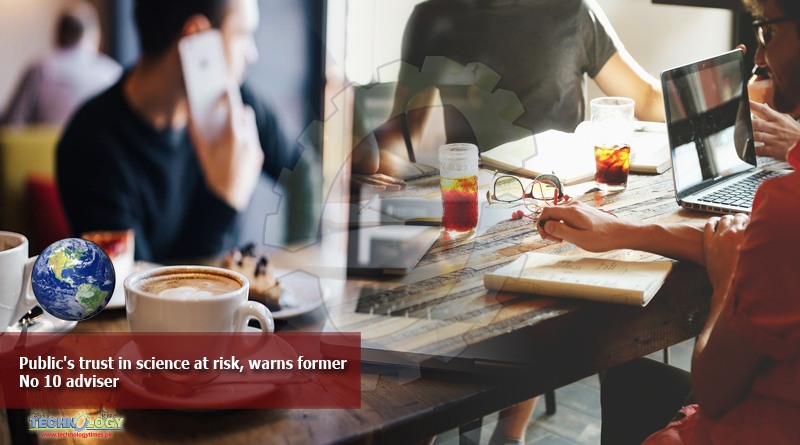Public trust in science risks being damaged by potential political interference, according to a former chief scientific adviser who has set up a panel of experts to rival those advising ministers.

Prompted by growing concern about the lack of transparency around the government’s Scientific Advisory Group for Emergencies (Sage), Prof Sir David King has convened a panel of experts that he says will act as an independent alternative.
The group, which will broadcast live on YouTube and take evidence from global experts, will hold its first meeting on Monday.
“I’m worried that with ministers [and] the prime minister continually saying ‘We’re following the science advice all the way’, that science is potentially going to be damaged by this,” said King. “I believe it’s fair to say that while scientists can give advice … it is governments who have to make political decisions.
“You can’t hide behind the scientists when you do that, particularly if those of us in the public domain don’t know what the scientists were advising because the advisers are not free to come on radio and television and tell us what their advice has been.”
King cited the government policy on face masks, which he said appeared to be politically convenient, but ran in contradiction to the best available evidence.
Read more
“There’s plenty of evidence to indicate that the wearing of face masks is a major help in reducing person-to-person viral transfer,” King said. “This is why it has become so much a part of the culture in South Asia.”
When Austria introduced a requirement to wear face masks in public, the incidence of Covid-19 “just collapsed around that one piece of advice”, he added.
“I wonder whether that decision, apparently by Sage … was driven by the necessity of not requiring it because we don’t have the face masks available in this country,” said King.
“That’s a political issue. My advice would always be that face masks are required and that if we don’t have them, you need to see we acquire them for the people at large.”Advertisement
The group, which includes a range of leading scientists working across public health, computer modelling, behavioural science and intensive care medicine, aims to present the government with “robust, unbiased advice”.
King argues that the official Sage is compromised by the fact that 16 of the 23 known members of the committee, including the prime minister’s strategist Dominic Cummings, are employed by government.
The Independent Sage meeting will cover seven areas, including the criteria for lifting lockdown, testing and tracing and quarantine and shielding policies for vulnerable groups. It will formally submit its recommendations to the health and social care select committee, placing pressure on the government to explain the advice behind its lockdown exit strategy, parts of which are expected to be unveiled in the coming week.
King said that the biggest potential pitfall in weeks ahead would be to relax lockdown measures too soon and that he believes the government’s so-Public trust called five tests for whether it is safe to ease restrictions are inadequate.
“My own feeling is that the extent to which the virus is still in the population means we are not yet close … to coming out of lockdown,” he said. “Undoubtedly the biggest potential pitfall is removing lockdown too early and too quickly.”
A second peak, he said, could not only increase casualties, but could also lengthen the overall period of time before the country is able to fully exit lockdown. “If you go into a second peak, it just becomes more and more difficult to end the pandemic,” he added.
King previously held the chief scientific role, now occupied by Sir Patrick Vallance, between 2000 and 2007 and served as the UK’s climate envoy from 2013 to 2017.Advertisement
The independent advisory group will include some vocal critics of the government’s Covid-19 policies, such as the global public health expert Prof Anthony Costello, as well as former and existing Sage experts.
News is under threat …
… just when we need it the most. Millions of readers around the world are flocking to the Guardian in search of honest, authoritative, fact-based reporting that can help them understand the biggest challenge we have faced in our lifetime. But at Public trust this crucial moment, news organisations are facing an unprecedented existential challenge. As businesses everywhere feel the pinch, the advertising revenue that has long helped sustain our journalism continues to plummet. We need your help to fill the gap.
You’ve read 22 articles in the last six months. We believe every one of us deserves equal access to vital public service journalism. So, unlike many others, we made a different choice: to keep Guardian journalism open for all, regardless of where they live or what they can afford to pay Public trust. This would not be possible without financial contributions from those who can afford to pay, who now support our work from 180 countries around the world.
We have upheld our editorial independence in the face of the disintegration of traditional media – with social platforms giving rise to misinformation, the seemingly unstoppable rise of big tech and independent voices being squashed by commercial ownership. The Guardian’s independence means we can set our own agenda and voice our own opinions Public trust. Our journalism is free from commercial and political bias – never influenced by billionaire owners or shareholders. This makes us different. It means we can challenge the powerful without fear and give a voice to those less heard.
Reader financial support has meant we can keep investigating, disentangling and interrogating. It has protected our independence, which has never been so critical. We are so grateful.
We need your support so we can keep delivering quality journalism that’s open and independent. And that is here for the long term. Every reader contribution, however big or small, is so valuable
Originally Publish at: https://www.theguardian.com/
